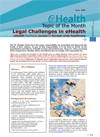 There are a number of examples in the health area on which Member States cannot act alone effectively and where cooperative action at the EU level is indispensable, especially regarding issues with a cross-border dimension or relating to the free movement of persons within the internal EU market. Both existing and emerging disparities in Member States' legislation and case-law concerning healthcare impair the development of cross-border services and produce distortions of competition.
There are a number of examples in the health area on which Member States cannot act alone effectively and where cooperative action at the EU level is indispensable, especially regarding issues with a cross-border dimension or relating to the free movement of persons within the internal EU market. Both existing and emerging disparities in Member States' legislation and case-law concerning healthcare impair the development of cross-border services and produce distortions of competition.
Differences exist across Member States on the local, regional and national level in terms of per capita spending on and inputs to healthcare systems. Member States try their best to improve those systems as well as they can.
Lack of financial resources is not the only problem. Quality, accessibility and sustainability of care are also limited because best practices are not shared.
In line with the eHealth Action Plan the Commission will issue a Recommendation on eHealth interoperability in 2007, addressing the core eHealth infrastructure data (patient summary, emergency data set). It is expected that the ongoing Commission's Health Services Initiative will equally cover cross-border healthcare services which move electronically.
Download "Legal Challenges in eHealth - eHealth facilitates access to Europe-wide healthcare" ICT for Health Unit (eHealth) Publication (.pdf, 1,1 MB)
For further information:
ICT for Health
European Commission - Information society and Media DG
Office: BU31 06/73 B-1049 Brussels
Email: This email address is being protected from spambots. You need JavaScript enabled to view it.
Tel: +32 2 296 41 94
Fax: +32 2 296 01 81
http://europa.eu/information_society/eHealth